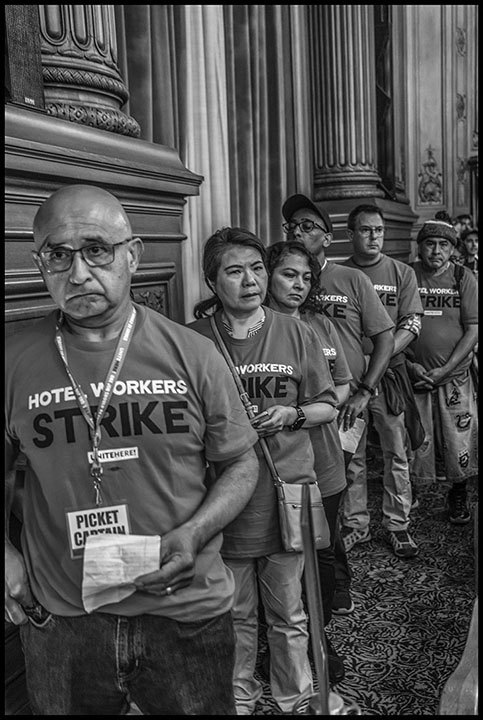04 - Strikers Tell Supervisors, One Job Should be Enough!
SAN FRANCISCO, CA - 10/8/24 - Striking San Francisco hospitality workers marched from the three high-end Union Square hotels in the heart of the city's tourism district to City Hall, where they asked the Board of Supervisors to support them. UNITE HERE Local 2 struck the hotels on September 22, and workers have announced they won't go back to work until they have a new contract. In the meantime, guests have been fleeing the hotels as service inside has bottomed out, while outside the strikers pound on drums and any other available sound-making instrument to dramatize their action.
Many workers described to supervisors the dirty rooms in the struck hi-rises. Management and replacement scabs, they charged, can't approach the level and skill of workers who normally have to clean 15 rooms a day, to the standards expected by guests paying hundreds of dollars a night. In response, Supervisor Hilary Ronen noted that a city ordinance already requires basic cleanliness and services, and that apparently it is not being adequately enforced.
She proposed a measure that would make hospitality standards, including the staffing levels needed, a condition for the permits the hotels need to operate. "This weekslong strike has raised serious concerns about the hotel industry and the health and safety of its workforce," added supervisor and labor-supported mayoral candidate Aaron Peskin.
In the huge 2018 strike against Marriott Corporation, the world's largest hotel operator, the fact that hotel wages were not enough to suppport a family in one of the world's most expensive cities provoked a chant that has since become universal - "One Job Should Be Enough!" It is still the most popular one heard from bullhorns on the Union Square picketlines. "I have to work two jobs, and I am on strike at both of them," said Apple Ratanabunsrithang, a cook at the Hilton San Francisco Union Square and grab-and-go attendant at the Grand Hyatt San Francisco who testified at the hearing. "I cannot continue without a good raise, affordable health care, and fair workloads."
Hotel corporations made over $100 million in profits in 2022 and room rates are higher than ever. At the same time, they used the pandemic to cut staffing by 13%. "The hotel industry is recovering because our members work hard to clean rooms, cook and serve meals, and more - but workers and their families are getting left behind," said Lizzy Tapia, President of UNITE HERE Local 2. "Hotel workers are going to strike for as long as it takes to win."
Thousands of hotel workers have been on strike in several cities since Labor Day, some in limited duration stoppages, but others, like those in San Francisco, Boston and Honolulu, until the giant corporations reach an agreement. Some new agreements were won in Los Angeles and Detroit last year, and others since the strikes began, in Greenwich and New Haven CT, Providence RI, and San Diego CA. Strike votes have also been taken by workers in Baltimore, Honolulu, Kauai, Oakland, San Diego, Sacramento, San Jose, San Mateo County, and Seattle.
See the full set of photos here: https://www.flickr.com/photos/56646659@N05/albums/72177720321055139/
































